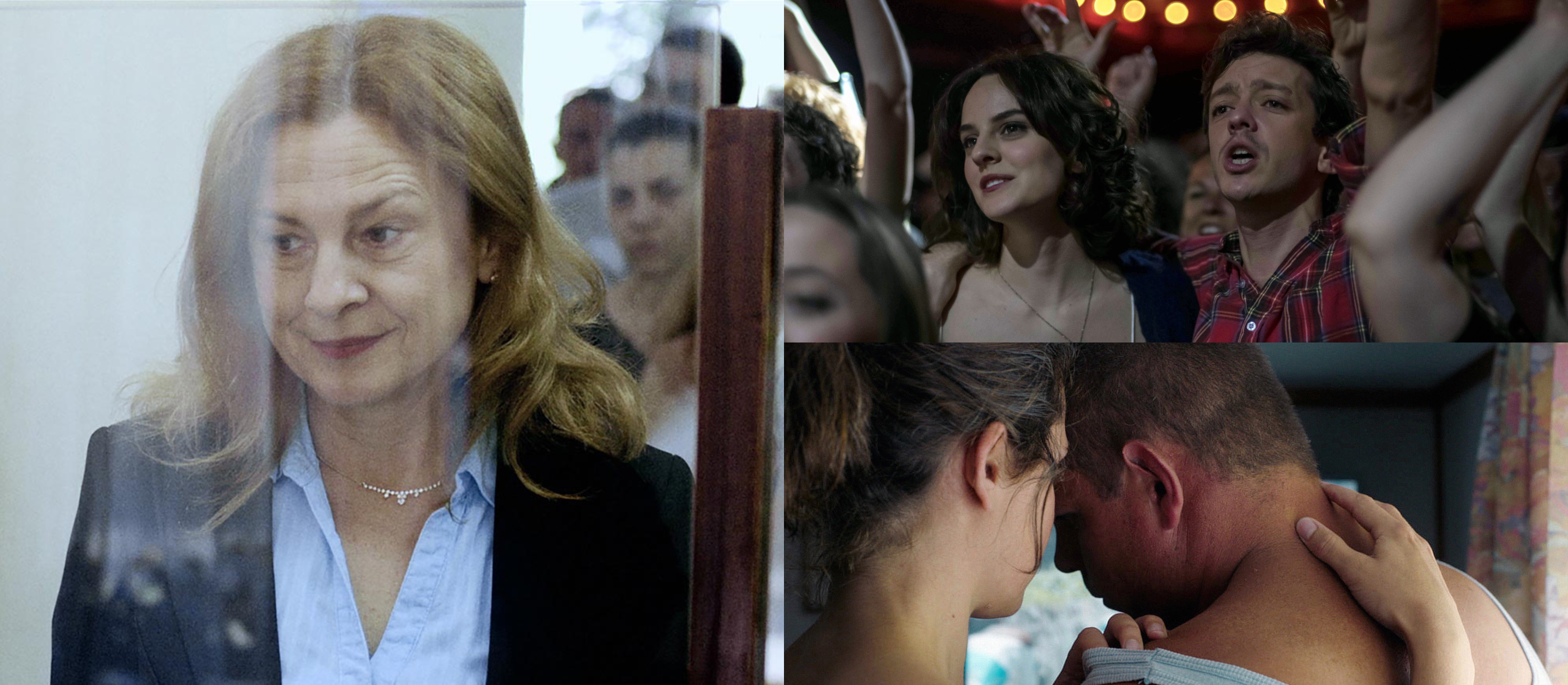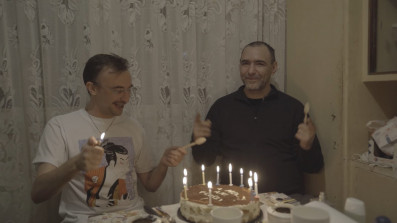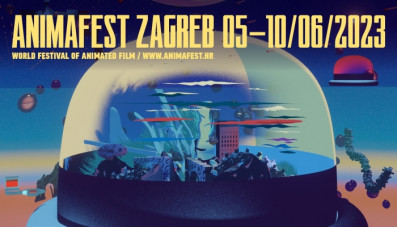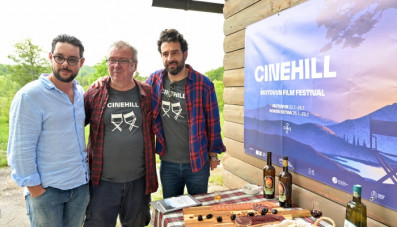
BERLINALE SPECIAL Day 6: Films about dealing with the trauma and an interview with Miloš Pušić
Working Class Hero by Miloš Pušić is our highlight of the Berlinale day 6
Day 6 of the 72nd Berlinale film festival in the main competition programme brought us two new films dealing with the trauma Drill Water by Michael Koch and One Year One Night by Isaki Lacuesta. Still, the highlight of the day for the Duart team here at Berlinale definitely was the film "Working Class Heroes" by Serbian director Miloš Pušić. Director Pušić brings a story of a construction company fixer, the dirty work she has to do to pay her rent, take care of her family and climb the leader in the business world. Opposite of her story the film follows a group of underpaid construction workers as they struggle to survive in a tough environment hoping for the better days yet to come. A full review of the film is available on the Duart platform.
Interview with Miloš Pušić
Hello Miloš, first of all, congratulations on having the world premiere of your latest film Working Class Heroes here at Berlinale. So can you tell us how did you come up with the idea for the film?
Thanks. Well, the idea came to me a very long ago, and it took quite a while for the film to be made. We wrote the first draft of the script maybe 10 years ago. We were inspired by events here in Serbia. It started from the news we saw in the newspapers about the workers dying on the construction sites. This happened very often and no one ever got processed. You know, there was never anyone who would answer for these crimes, to say. It was just the small news unimportant. And it came like that almost every day, or at least more than anyone notices.
_________________
In Serbia, during the past 20 years, there were quite a lot of building sites. During the transition, the old parts of the cities were destroyed, new buildings were made. And during that a lot of people got rich, and a lot of people were left without anything. So those were the two starting points of the film.
_________________
Of course, the story is fictional. But it was inspired by real events very much. We made it a story about the woman who was working as a fixer in the construction building mafia as she's trying to find her way to feed her family and to move forward on the social ladder. So that was our inspiration. And during those years, we changed the script quite a lot. We had a lot of problems financing the movie because it looks like film funds and the country were not very fond of it. So in the end, we decided that we will shoot it sort of guerilla-style. We shot it on in 23 days.
Then we waited for post-production for maybe two years, because it was really expensive. And we couldn't finance it. But I don't want this to sound like a sad story. You know, we are very happy that we have finished the film. I just want to say it was a difficult one. It was a long process. And it was exhausting. Now the film is in Berlin so it all makes sense.
It's quite normal that films have their evolution from the first draft of the script up until the filming. But I'm curious a bit more now about the construction workers rights and the news about their deaths. How much did the situation in Serbia change for them compared to 10 years ago when you and the team first got the idea for the film.
I think it absolutely is the same. Sometimes during the summer when they're building quite a lot, it's even worse. And what I don't like, but I have to say is that it's still a hot topic. This makes it good for our film but it's bad for our lives, you know because it repeats itself all the time. And in the end, I don't think it's a story only about Serbia. You know, I think it's much wider. You can hear the stories about this all around in Germany or Croatia, in Bosnia, everywhere.
For me, it's a story about those class systems where those who are rich and are getting richer and richer, and about those who don't have anything and are becoming less and less important. I think that their lives are even becoming not important for the country, society... So I have to say it's still a hot topic.
Two years ago, here at Berlinale, Srdan Golubović had a world premiere of Father, another film that was conceived on the new newspaper article. Does the media coverage do any justice to these stories, or are they just one in many they cover for the sake of views. Did this coverage help you build the story?
I have researched quite a lot about this topic. And I did the research by mostly talking to the people who are working on construction sites. Mass media just makes, like big news. Something like this goes as today's hot topic for them. And after the day is, they forget about it, they're looking for another hot topic. So for me, it was way more important the opinion of like common, ordinary people, the workers who were telling me their stories, for example.
As there are professional actors, and the extras who are real workers in the film, one of the real workers told me his story and parts of it ended up in the film. Another worker told me that he was working for his boss on a construction site for two and a half years without receiving the salary. You know, this whole thing is crazy, you just can't believe that we live in this kind of society. That worker as all the time fooled. He just got the false promises, maybe some bits here and there. And he continued believing that things will change, you know, so people are desperate for their jobs. And that's why things like that can happen.
While watching the film, the workers' representation felt genuine. For me, like, looking at those workers and looking at those stories. It seemed not just plausible, it seemed like a reality for the majority of the time. And yeah, like, I felt that some actors were not the actors. So I'm curious how was it to work with people that had no experience on film before?
Well, it's a delicate matter. But if you gain trust with them, if you have professional actors who don't behave like stars, that helps a lot. That was important for me, you know, if you have an actor who comes to the set, does his scene and goes out the way then there is a really big difference.
_________________
Here, the actors were carefully chosen. And our rule was to spend as much time as we can, together with the workers. So all of us ate together, talked together. It was not only about rehearsing the scenes, it was more about making a connection, making workers feel that they won't be misused.
_________________
This way we were making the actors relaxed, you know, just gave them an opportunity to improvise sometimes react to what's happening in the shot because I like working like that. I like just setting the scene giving them a chance to give a few lines, telling them what the scene is about and asking nonprofessionals just to react as they would react in real life? So for me, it's always a good mix, you know, to combine professionals and amateurs.
When we are talking about the professionals, Boris Isaković and Jasna Đuričić are in your film, and it's still fresh after "Quo Vadis Aida". So, how hard was it for them to shape these new roles? And what reactions do you expect from the audience? Are you afraid people will not be able to see them in these new surroundings so soon?
We were shooting this movie, approximately at the same time as they were shooting "Quo Vadis Aida". So it was not shot after the release of the film. And we are friends for a long time. So they know how to work professionally and I like to work with them. I don't think that the audience will have a problem making a distinction between the roles.
Of course, now Jasna has that very special title of best European actress that gives her and that film a special honour. But I know she's not the kind of person who goes to the clouds, you know, she's very down to her to the ground. And she loves people, you know, she has special attention to, to people to their stories to their troubles. She's never behaving like some "nose up" superstar. And, for me, that was why this role was written for her. You know, that's, why I chose her from the beginning. She's a very, very approachable person. And she has really good communication with everyone. So it has some sort of burden right now. But when we worked, when we made the movie, we didn't have anything that may be more difficult than in other movies.
I'm curious about the ending, like, at what point did you decide to end the film the way you did? It's quite brutal!
One of the main themes of this movie, is of course the workers, their rights, but this is also a film about justice. If you look for some key events in the movie, from the beginning till the end of the movie, there is no punishment for anything that happens in the movie. And I have a feeling that in our society, it's also like that. We lost the compass of what's good and what's bad. I think that the good things should be awarded, and bad things should be punished. So because we can't do that in life, I wanted to have some sort of freedom to deal with, you can say call it poetical justice, you know, why not? If I cannot do things like that, in real life, there are movies.
So my last question is, do you believe that you can make some kind, or any kind of impact with this film, not just here in Berlin, but generally speaking, could it be the conversation starter on this topic in Serbia or in the southeast European region?
We will see. Tonight is the world premiere of the movie here at Berlinale. In Serbia, audiences will see it on Fest in two or more weeks. Still, people are talking a lot about the movie as they have seen the trailer. Jasna is now the best European actress so that's also a hot topic.
_________________
Quo Vadis Aida was quite a controversial film in Serbia, I don't think it should have been like that. So I think there will be some sort of debate on this movie. But what would I like to escape talking about is the daily politics in this movie because I don't think it's about that.
_________________
It's about essential problems you know, it's the problems that the working class has had for a long time and it looks like these problems will last for quite a while. On a bit more personal side, you know, I would love if the film stayed with the audience after the ending, make them think about it for a while, not just to get out of the cinema, have a beer and forget about it.
I would be happy if that's the score, and I hope it will travel to the festivals but I can't say anything yet as we're waiting for responses. From some first reactions from journalists, people can relate to the story and that is important for me. I didn't want to make some artistic "card house" movie where you don't understand what's going on where people are watching through the windows for 10 minutes straight as they are thinking. I wanted to show common people, people the audience can understand and maybe relate to or at least care about, the characters that can be loved or hated. So these first reactions show me that I have already succeeded with my intentions and it feels great.















